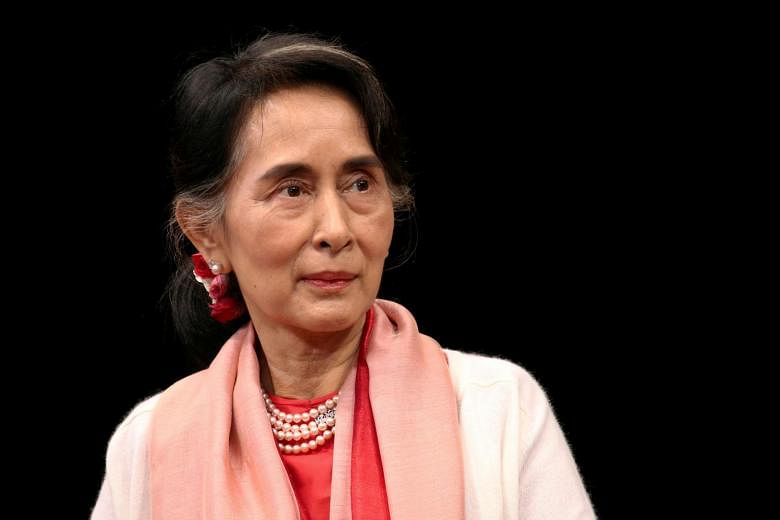YANGON (REUTERS, NYTIMES) - A court in military-ruled Myanmar deferred on Tuesday (Nov 30) verdicts in the trial of ousted leader Aung San Suu Kyi to Dec 6, a source familiar with the proceedings said.
The court had been due to rule on charges of incitement and violations of a law on natural disasters, accusations that Ms Suu Kyi has rejected.
The source, who spoke on condition of anonymity, did not give a reason for the deferral.
The court in the capital, Naypyitaw, could not immediately be reached and a spokesperson for the ruling military council did not answer telephone calls early on Tuesday.
The 76-year-old, who was detained in a military coup in February, is facing other charges and a maximum imprisonment of 102 years. Her trials have been held in closed-door hearings in Naypyitaw, the capital of Myanmar.
The junta has barred all five of her lawyers from speaking to the media, saying their communications could "destabilise the country".
The ruling would come a year after Ms Suu Kyi led her party to a landslide election victory, trouncing the military-backed party.
A guilty verdict is likely to galvanise an opposition movement that has spurred thousands of people to take up arms against the army since February when the generals seized power. The United Nations and foreign governments have described the trials as politically motivated.
In the months since the coup, people have gathered in the streets, doctors and nurses have stopped work in protest, and many have refused to pay taxes in a campaign known as the Civil Disobedience Movement.
Despite the threat of arrest, there is still widespread support for the movement. A growing number of soldiers are defecting, teaming up with armed protesters and insurgent groups to launch hit-and-run attacks against the military.
The junta has responded by cracking down - it has killed 1,297 people and arrested more than 10,500 others, according to the Assistance Association for Political Prisoners (Burma), a human rights organisation based in Thailand.
The National Unity Government, a group of deposed civilian leaders, said last week that it raised US$6.3 million (S$8.6 million) from people who bought "bonds" to fund its revolution.
For many of her supporters, Ms Suu Kyi was seen as the only politician who could lead Myanmar toward full democracy. The country had been ruled by the military for half a century since 1962. After Ms Suu Kyi was elected in 2015, she was forced to share power with the army, which appointed 25 per cent of parliament.
She has not been seen in public or been able to speak to anyone beside her lawyers since she was detained on Feb 1. Just hours before she and her colleagues from the National League of Democracy Party were to take their seats in parliament, military officers detained them, accusing them of voter fraud. Ms Suu Kyi has denied the charge.
Rights activists have condemned the charge of incitement, saying it is used to intimidate critics of the military. It carries a maximum sentence of three years and states that anyone who "publishes or circulates any statement, rumour or report" with "intent to cause, or which is likely to cause, fear or alarm to the public" could be found liable.
Prosecutors have continued to slap more charges on Ms Suu Kyi as her case proceeded.

